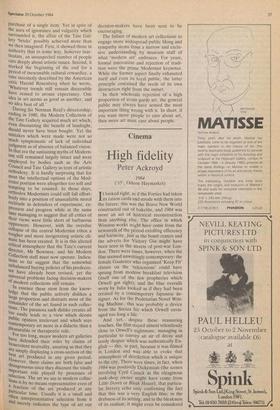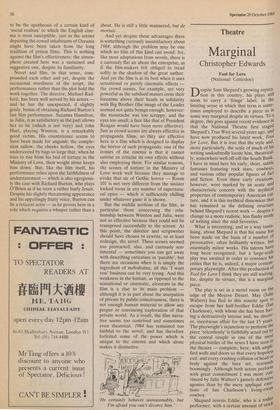Cinema
High fidelity
Peter Ackroyd
1984
(`15', Odeon Haymarket) _itslooked right, as if the Forties had taken _LB ration cards and strode with them into the future; this was the Brave New World constructed out of bakelite, and 1984 was more an act of historical reconstruction than anything else. The office in which Winston works might have come from the newsreels of the period extolling efficiency and harmony, just as the bomb craters and the adverts for Victory Gin might have been seen in the streets of post-war Lon- don. There were times, however, when the film seemed unwittingly contemporary: the female Gauleiter who organised 'Keep Fit' classes on the lelescreens' could have sprung from modern breakfast television (itself one of the few prophecies which Orwell got right), and the blue overalls worn by Julia looked as if they had been created by a contemporary Japanese de- signer. As for the Proletarian Novel Writ- ing Machine, this was probably a device from the Sixties for which Orwell envis- aged too long a life.
And yet, despite these reassuring touches, the film stayed almost relentlessly close to Orwell's nightmare, managing in particular to convey an air of decay and seedy despair which was authentically En- glish — this, in part, because it was filmed in London and was able to evoke that atmosphere of dereliction which is unique to the city. There were times, in fact, when 1984 was positively Dickensian (the scenes involving Cyril Cusack as the oleaginous junk-shop owner might have come from Little Dorrit or Bleak House), that particu-
lar literary, echo only confirming the fact that this was a very English film; in the
drabness of its setting, and in the bleakness of its realism, it might even be considered to be the apotheosis of a certain kind of 'social realism' to which the English cine- ma is most susceptible, just as the scenes depicting the cowed inhabitants of Oceania might have been taken from the long tradition of prison films. This is nothing against the film's effectiveness: the atmos- phere created here was a sustained and suggestive one, despite its familiarity.
Novel and film, in that sense, com- pounded each other and yet, despite the occasional wordiness of the script, the performances rather than the plot hold the work together. The director, Michael Rad- ford, has been well served by his actors and he has the unexpected, if slightly grisly, bonus of obtaining Richard Burton's last film performance. Suzanna Hamilton, as Julia, is as satisfactory as the part allows her to be (which is not very) and John Hurt, playing Winston, is a remarkably good victim. His countenance seems to have been made for anguish: the comple- xion sallow, the cheeks hollow, the eyes underscored by bags so large that, when he tries to rise from his bed of torture in the Ministry of Love, their weight alone keeps him down. But, like the film itself, his performance relies upon the faithfulness of understatement — which is also egregious- ly the case with Richard Burton, who plays O'Brien as if he were a rather burly Jesuit. Despite his slightly threatening appearance and his appallingly fruity voice, Burton can be a reticent actor — as he proves here in a role which requires a whisper rather than a
shout. He is still a little mannered, but de mortuis. . . .
And yet despite these advantages there is something curiously unsatisfactory about 1984, although the problem may be one which no film of this kind can avoid: for, like most adaptations from novels, there is a curiously flat air about the enterprise, as if the film-makers felt obliged to tread softly in the shadow of the great author. And yet the film is at its best when it uses sensational or purely cinematic effects the crowd scenes, for example, are very powerful as the subdued masses cross their forearms above their heads in solidarity with Big Brother (the image of the Leader seemed not quite benign enough, however: the moustache was too scrappy, and the eyes too small; a face like that of President Reagan would have been more effective). Just as crowd scenes are always effective in propaganda films, so they are effective here in a film which is designed to display the horror of such propaganda: one of the ironies of the cinema is that it cannot satirise or criticise its own effects without also employing them. For similar reasons, the scenes of torture in the Ministry of Love work well because they manage to evoke that air of Gothic horror — Room 101 is not very different from the sinister locked room in any number of supernatu- ral epics — which is sufficiently chilling under whatever guise it is shown.
But the middle sections of the film, in particular those concerning the rela- tionship between Winston and Julia, were not so effective because they could not be transposed successfully to the screen. At this point, the director and scriptwriter should have chosen to rewrite, or at least redesign, the novel. These scenes seemed too protracted, also, and curiously sen- timental — sometimes you can get away with describing caricature as 'parable', but there are occasions when it is simply the ingredient of melodrama; all this 'I want you' business can be very trying. And this weakness in the human, as opposed to the sensational or cinematic, elements in the film is a clue to its main problem although it is in part about the usurpation of private by public consciousness, there is not enough human material to allow any proper or convincing exploration of that private world. As a result, the film narra- tive seems too contrived and sometimes even theatrical. 1984 has remained too faithful to the novel, and has therefore forfeited some of the power which is unique to the cinema and which alone makes it distinctive.
'He certainly behaves unreasonably, but I'm afraid you can't divorce him.'



















































 Previous page
Previous page